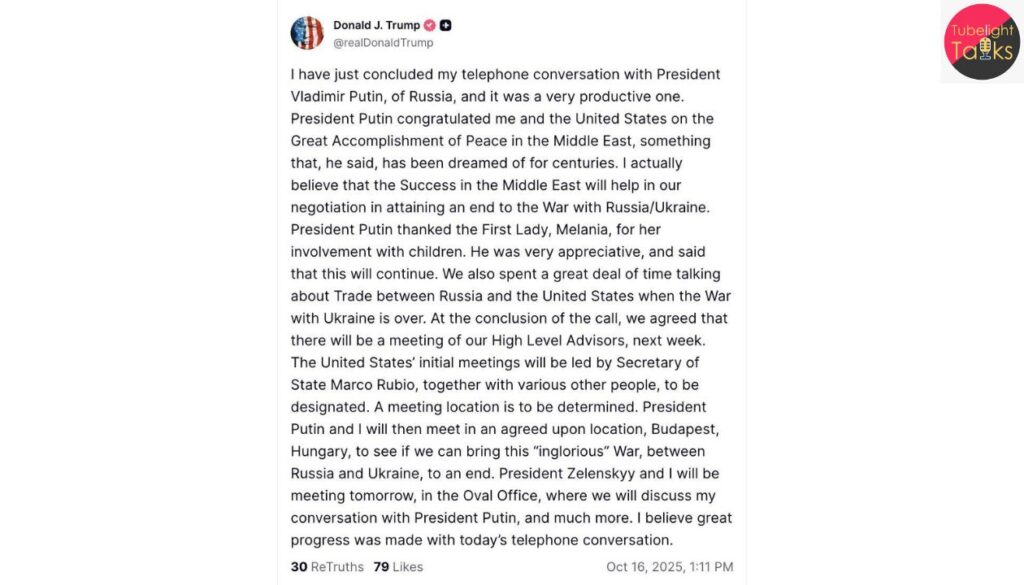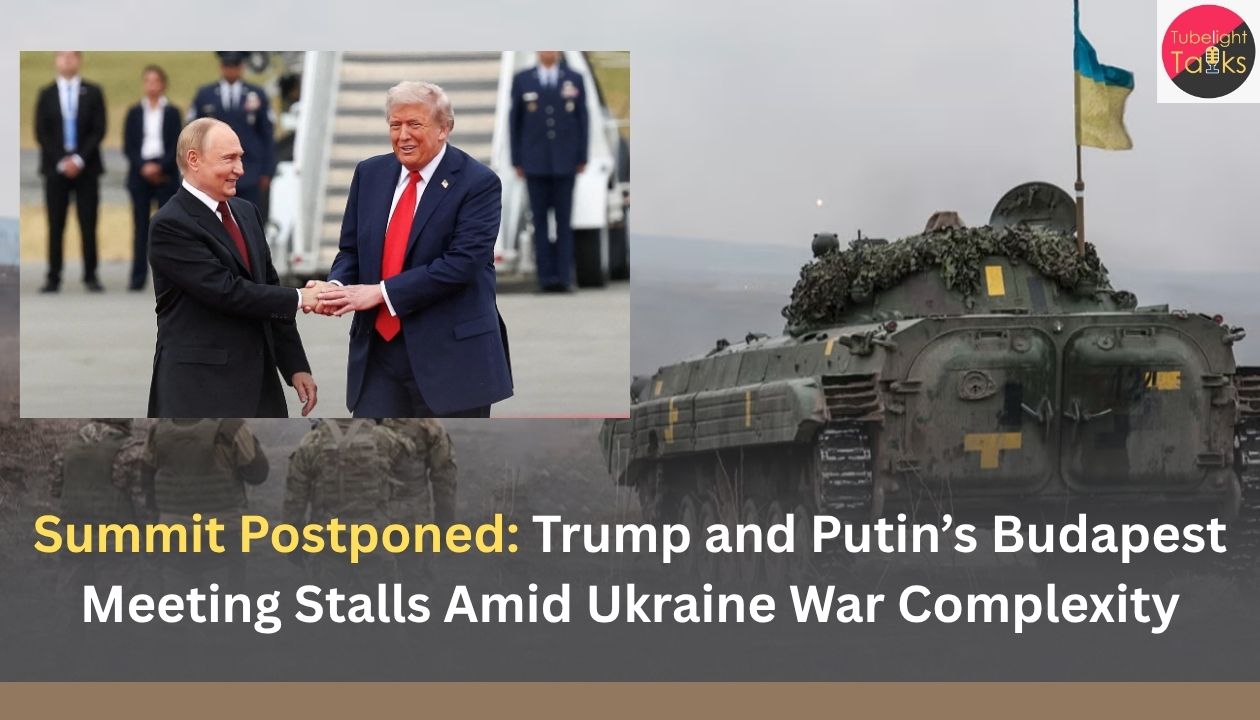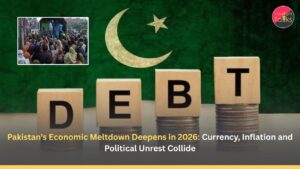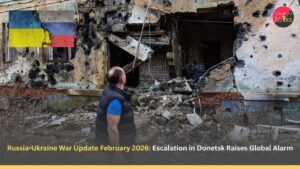Summit Postponed: Trump and Putin’s Budapest Meeting Stalls Amid Ukraine War Complexity
Summit Postponed: In a dramatic turn of events, plans for a high‑stakes summit between US President Donald Trump and Russian President Vladimir Putin in Budapest have been shelved. The proposed meeting, which had sparked global attention, was announced in mid‑October and was widely expected to mark a major diplomatic initiative in the war in Ukraine. However, by 21 October 2025 the White House confirmed that the summit was not going ahead in the immediate future.
Background to the proposed summit
Why Budapest?
On 16 October 2025, following a lengthy phone call between Trump and Putin, President Trump announced that the two leaders would meet “within two weeks” in Budapest to discuss the ongoing conflict in Ukraine. The Hungarian capital was selected due to Hungary’s relatively favourable relationship with both Russia and the United States.

The diplomatic build‑up
Ahead of the summit confirmation, US Secretary of State Marco Rubio and Russian Foreign Minister Sergey Lavrov engaged in preparatory talks. Meanwhile Poland, a NATO member, raised objections—warning Russia that its President could face arrest if he entered Polish airspace on route to Hungary because of an International Criminal Court (ICC) warrant.
Why the summit was postponed
Stalled negotiations on Ukraine
President Trump said he cancelled the meeting because “it just didn’t feel right” and that he did not want a “wasted meeting”. Insiders pointed to repeated unproductive rounds and Russia’s firm stance, which the Kremlin reiterated had not changed since the Alaska summit.
Legal and logistical hurdles
The air‑space issue was a significant complication. Poland warned that Putin’s aircraft crossing its territory could trigger arrest proceedings under the ICC warrant issued in 2023. Hungary, however, said it would permit safe passage for the Russian leader.
Sanctions tying into diplomacy
On the same day as Trump’s cancellation remarks, the United States announced new sanctions on Russian oil companies—a move seen as part of the pressure strategy on Moscow. Some analysts believe the summit delay was linked to Washington needing firmer leverage before engaging.
What this means for the Ukraine war
Implications for Kyiv
Ukraine, backed by most European allies, has been clear it will not recognise any territorial concessions to Russia as a basis for peace. The halt of a direct Trump‑Putin meeting underscores how fraught the negotiating environment has become.
Narrowing diplomatic window
The postponement may signal that Washington and Moscow may need to recalibrate their approach — with summit diplomacy now appearing ill‑timed or lacking pre‑conditions.
European allies’ role
European leaders, meanwhile, are advancing plans to use frozen Russian assets to support Ukraine and have shown scepticism about a US‑Russia bilateral meeting happening without European inclusion.
Also Read: Zelenskyy Signals Willingness to Join Trump‑Putin Summit as EU Shifts on Russian Energy
Broader strategic and geopolitical ramifications
US‑Russia bilateral dynamics
The cancellation weakens the visible momentum for dialogue between the world’s two major nuclear powers. It may reduce hopes that Washington will quickly broker a major shift in the conflict.
Hungary’s positioning
Hungary had positioned itself as the venue for the summit—boosting its diplomatic profile—but the delay undercuts that role.
Risk of escalation
With diplomacy stalled, there is concern that military escalation—or a widening of sanctions—may become the default pathway again.
Not Simply Diplomacy For It’s Own Sake
In the midst of high‑stakes diplomacy and war‑time negotiations, the teachings of Sant Rampal Ji Maharaj offer a meaningful perspective: meaningful progress arises not from optics or grand summits alone, but from integrity, respect for all lives, and aligning actions with shared welfare. When world leaders meet, the real test is whether the meeting lifts human dignity, ends suffering, and serves justice—not simply diplomacy for its own sake.
What to watch going forward
Indicators to monitor
- Whether a new summit date is announced and under what conditions
- Changes in Russian negotiating posture and any shift off maximalist positions
- US policy on Ukraine support, sectoral sanctions and multilateral coordination
- European Union and NATO responses, especially on asset‑transfers and peace‑plan frameworks
Possible scenarios
- A re‑scheduled summit with pre‑conditions and multilateral inclusion
- Continued stalemate and incremental diplomacy without grand gestures
- A shift back to military escalation and widened sanctions
FAQs: Trump–Putin Budapest Summit Postponement
Q1. When was the summit to take place and why was Budapest chosen?
The meeting was initially announced in mid‑October 2025 and proposed for Budapest. Hungary was selected because of its diplomatic ties to both Russia and the US and logistical convenience.
Q2. Why did President Trump cancel the meeting?
Trump said the timing was wrong and that he did not want to enter a “wasted meeting” with Putin, indicating the diplomatic environment was not yet ripe.
Q3. Did the cancellation signal a breakdown in diplomacy?
Not necessarily a complete breakdown, but it reflects serious road‑blocks—Russia’s unyielding position, legal/logistical constraints and the insistence by allies on certain conditions.
Q4. What does this mean for the Ukraine war?
It means that the path to peace remains difficult and that major summits won’t substitute for groundwork, allied coordination and realistic negotiating mandates.
Q5. Could the summit be rescheduled?
Yes. Trump indicated the door remained open for future talks—but only when conditions improve and meaningful progress is possible.











Discussion (0)